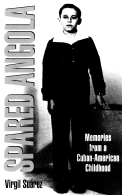Memories from a
Cuban-American Childhood
Virgil Suárez
(Arte Público)
 He was born in Cuba in 1962. His father was a policeman for the Batista regime --- so the family was stigmatized: the old man was known as a gusano, a worm. The innocent boy was also stigmatized, which is the way it is with families and governments and dictatorships.
He was born in Cuba in 1962. His father was a policeman for the Batista regime --- so the family was stigmatized: the old man was known as a gusano, a worm. The innocent boy was also stigmatized, which is the way it is with families and governments and dictatorships.But they gave Virgil Suárez something that few others had. They gave him the name of the classic poet, along with an imagination, and words, and a way to put those words together. After a short hiatus in Spain, the family moved to Los Angeles where, with the help of some lively teachers, honored here --- he became a writer --- discovering the power of putting words down, for others to savor.
Spared Angola is the tale of his self-discovery, along with tales of the wonders he had to leave behind with his childhood, the eternal regret over a country in the hands of others, memories smudged and faded, like old photographs. He feels, and writes strongly, about the fate of all sad exiles.
But the tale is not just one of regret; and it certainly isn't one of memories stained by time. Spared Angola works because Suárez knows how to put words together simply --- a Cuban-American Hemingway. He knows how to sketch the memories, the good and the bad. Killing animals for food; being caught with his pants down; watching his father turn old and decrepit; being taken in the back room by an older girl (he, so frightened, pisses on her.)
Suárez also knows how to juxtapose concepts, child's concepts running together, as a child's mind would meld them: the description of his father's desperate, bloody job, butchering horses --- mixed with the memory of a night in a strange bed in Spain, listening to his father, in the next bed, demanding love from his mother, whispering, "If you don't, I'll look for a Spanish woman who will," and then, the author says, "the cleaver falls and cuts through the skin, tears through the flesh, crushes the bone, and then there is the blood..." Wonderful.
When Suárez is describing their lives in San Pablo, or Havana, or Madrid, or in the Los Angeles barrio --- or when he tells us about grandmother Donatila and the magic of her words (that turned into the magic of his words) --- he can do no wrong. When he is telling of his discovery of writers, reading Poe, Hawthorne, Melville, Flannery O'Connor, he can be as moving as Richard Wright. telling of his illegal library card.
But, towards the end, Suárez loads...then loses...the deck. He sticks in long poems which at times add, more often detract from the history. It's a pity he had no Maxwell Perkins to help him shape the book, for it begins to splay, becomes an admixture of poetry and prose that doesn't quite fuse. So-so poems about frogs, and guilt, and suburbia, intermixed with a wonderful tale about his green teeth (his mother took tetracycline when she was embarasada; it had a lifetime effect on his molars).
Our tale, ends, engagingly enough, with a quote from Dostoyevsky:
"I am a sick man...a mean man. There's nothing attractive about me. I think there's something wrong with my...liver..."
Only Suárez substitutes, charmingly, "...there's something wrong with my...teeth..."
NOTE: Suárez has written several novels. Because his autobiography was so affecting --- I tried one called Going Under. It's OK if you are into the frustrations of being a Cuban-American life insurance salesman, driving on the freeways of Miami, connecting (barely) with your spirits, and, finally, diving off Key West, heading south.
We would hope that Suárez will use his considerable talents in other, more artful ways.